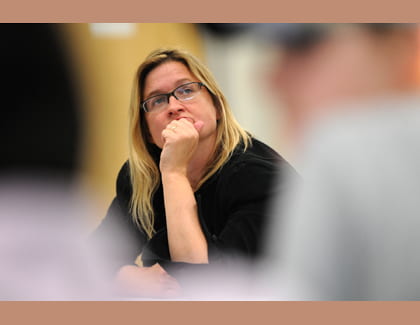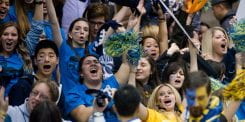Developing digital-age authors
Elizabeth Losh challenges students to become active, critical users of social media

The Internet and social media are redefining how people write and present themselves, and Elizabeth Losh believes mastering the genres and conventions of new media writing and crafting an online persona are critical to her students’ success.
Losh, writing director of UC Irvine’s longstanding Humanities Core Course, teaches an upper-division, undergraduate writing course on digital rhetoric. The class helps students become better-engaged creators and more-analytical users of the types of social media that are transforming modern communication.
“Students now are writing so much more for informal, social media than they are for coursework,” she says. “In my teaching, I’m hoping to find a synergy between traditional print culture and newer, digital media because I think each type can benefit from the other.
I want students to be conscious of the variation between conventions governing print and those governing online communication so they can take part in critical conversations about those differences.”
Losh, who earned two master’s degrees and a doctorate from UCI, first taught the digital rhetoric class in 2007.
“I wanted to have a course where students could break down the barrier between writing for course credit and writing for its own sake for a public audience – for example on Facebook or a personal blog,” she says.
Class topics span the digital media spectrum, from blogs and social network profiles to online video and virtual worlds. Want some background on the course? Look no further than a YouTube video Losh created to describe the seminar.
Class assignments include maintaining a personal blog, creating a YouTube video essay based on a detailed script and shot list, and helping build a class Wiki that covers course topics and themes. A handful of previous students continue to write regularly for the blogs they created while taking the class.
Losh also encourages students to engage with the course materialon a class blog where they share experiences and perspectives. Current posts detail students’ experience in Second Life and include an ethical discussion of whether having a virtual world extramarital affair counts as cheating.
In one post titled “Writing with Technology,” a student shared an insight on the course:
“This class is a great example of how we are actually applying the things we learn in class to the real world. With the help of various tools we use in class, we are able to do things that I would never have thought possible in a regular writing class. The projection screens, wireless devices, YouTube, blogging, and other new technology offer ways of learning that I hope will be applied to all classes in the future.”
